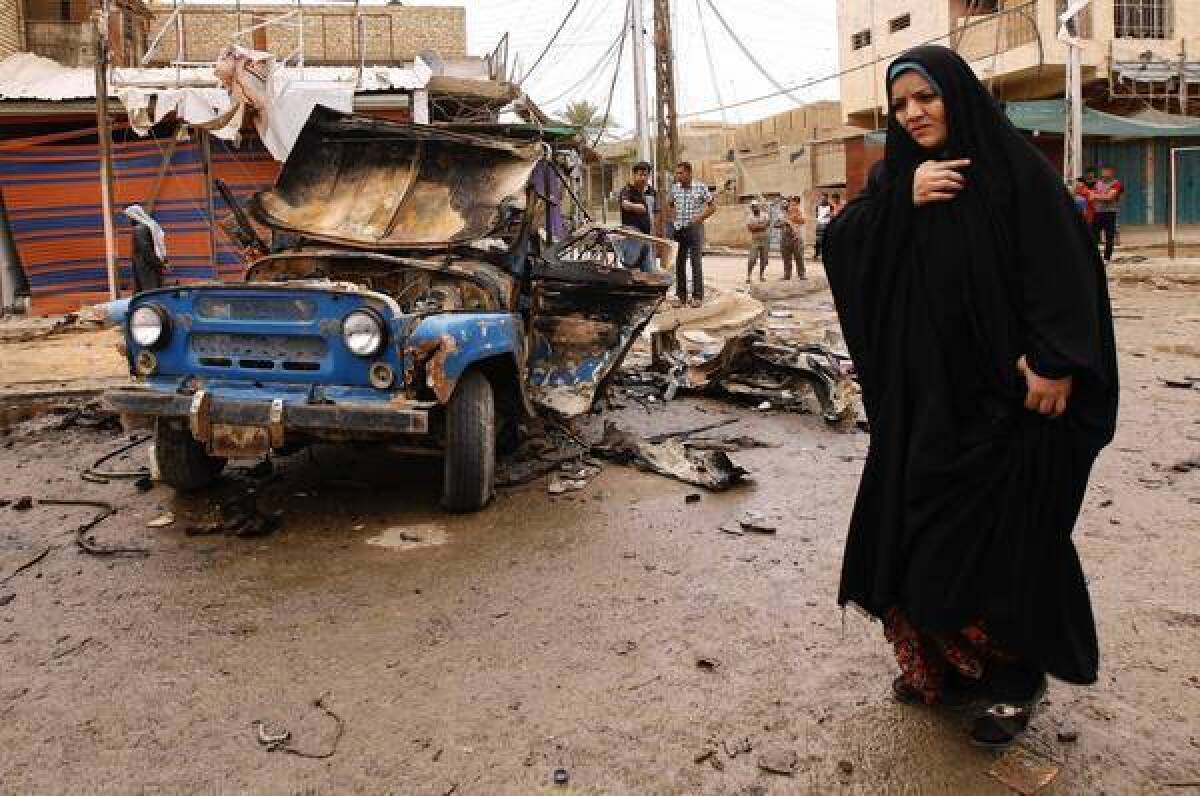Iraq car bombings leave dozens dead

- Share via
BAGHDAD — Car bombs around Iraq killed at least 65 people Monday amid the worst wave of violence in the country since U.S. troops withdrew a year and a half ago.
The attacks, which occurred along busy commercial streets in Shiite and Sunni areas, followed a string of bombings and other attacks last week that killed more than 200 people. The ongoing violence has stoked the impression among Iraqis that the country is sliding back into chaos reminiscent of the civil war that claimed tens of thousands of lives between 2005 and 2008.
Citing a number of sources, the Associated Press put the death toll Monday as high as 95.
Among the most worrying of the day’s attacks were a pair of car bombings in the southern city of Basra that killed at least 10 people. The previous day, Basra’s security commanders asserted that they had imposed new protective measures in the region, home to the vast majority of Iraq’s oil production and exports.
The Basra attack drew attention to how even the south is no longer free from strife. The region, with its Shiite Muslim majority, has been relatively quiet compared with areas in the north such as Baghdad, where Shiites and the country’s Sunni Muslim minority live close together.
Sunnis, who believe they have been marginalized since the fall of President Saddam Hussein in 2003, have served as the backbone of a tenacious resistance to the country’s Shiite-dominated government.
The bloodshed, coupled with an intractable dispute between Prime Minister Nouri Maliki and Sunni protesters who are demanding a repeal of laws they say discriminate against them, has left many fearful that Iraq is on the verge of splintering.
Security forces opened fire on demonstrators late last month in the northern city of Hawija, sparking days of violence in central and northern Iraq. The United Nations put the death toll for April at 712, making it the deadliest month in Iraq since June 2008. The unrest raises the specter of Iraq imploding at a time neighboring Syria is being torn apart by civil war.
In the aftermath of Monday’s bombings, Maliki warned lawmakers to stay away from a parliamentary session scheduled for Tuesday by his rivals to discuss the spiraling violence. He accused politicians he refused to name of being behind the unrest, and he threatened to send their names to the courts for arrest if they were not already wanted, saying some instigators of violence were trying to hide behind parliamentary immunity.
Many Baghdad residents were shaken by the bombings and the political discord.
“We still have a dream that one day all of us could see Baghdad without an explosion. It seems that day will never come,” said grocery shop owner Aamer Abdullah, 55. “The citizens of Baghdad prefer to stay in their homes instead of going out and getting killed. We blame the politicians and the security forces equally for what happened.
“Iraqi now is heading to the abyss,” he added.
The situation remains tense between demonstrators and the government, particularly in the western province of Anbar, where security forces have demanded the arrest of three protest leaders in Ramadi over the late April killings of five security personnel. The protesters insist their leaders are innocent, while the government has amassed troops around Ramadi.
In the last week, the government raided the home of a prominent Sunni tribal leader, further fanning tensions. Gunmen kidnapped eight policemen near Fallouja over the weekend, and their corpses were found Monday. Demonstrators warned over the weekend that the government was pushing them toward seeking some form of regional autonomy or even taking up arms.
In his remarks Monday, Maliki advised those in Anbar, “We are ready.”
Special correspondent Alwan reported from Baghdad and Times staff writer Parker from New York.
More to Read
Sign up for Essential California
The most important California stories and recommendations in your inbox every morning.
You may occasionally receive promotional content from the Los Angeles Times.












